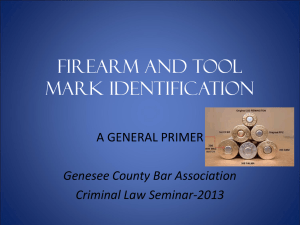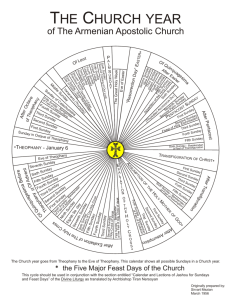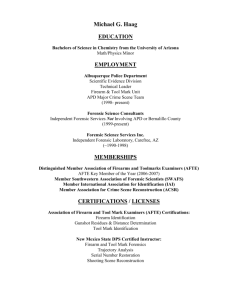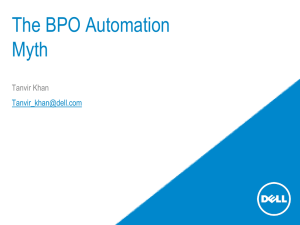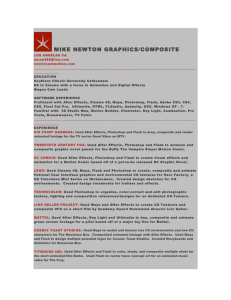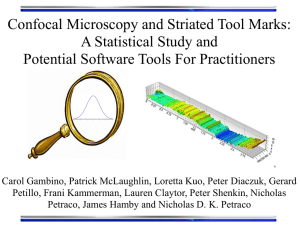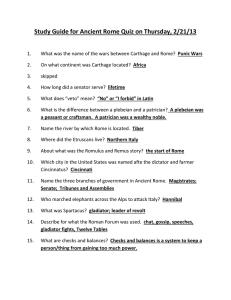Document 15023508
advertisement
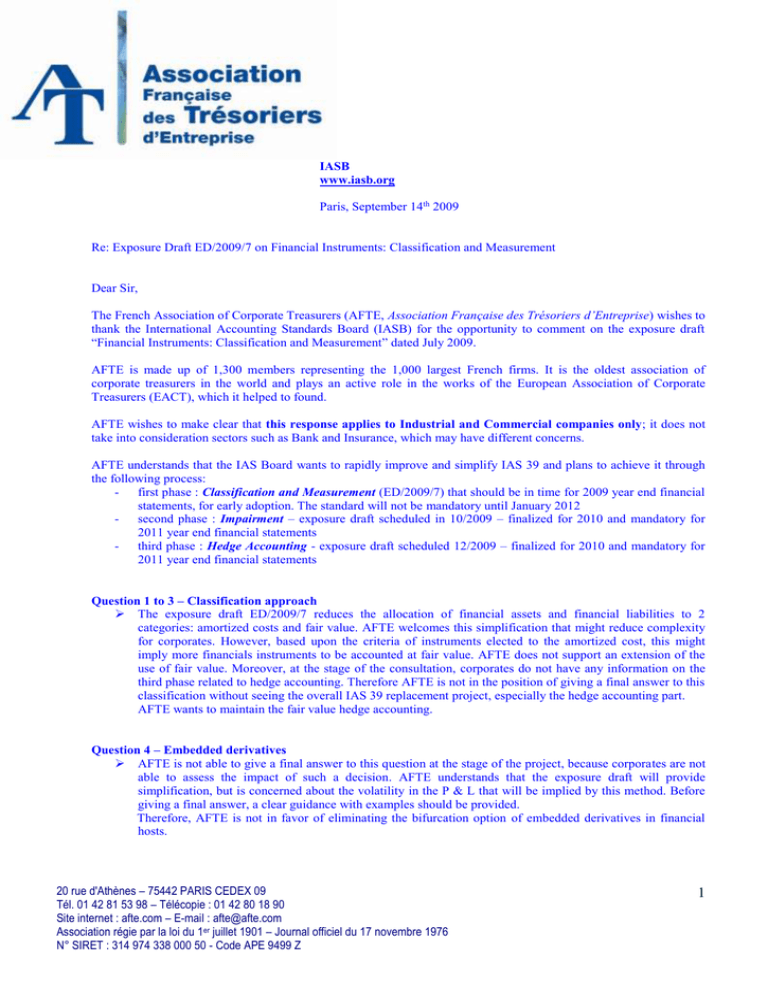
IASB www.iasb.org Paris, September 14th 2009 Re: Exposure Draft ED/2009/7 on Financial Instruments: Classification and Measurement Dear Sir, The French Association of Corporate Treasurers (AFTE, Association Française des Trésoriers d’Entreprise) wishes to thank the International Accounting Standards Board (IASB) for the opportunity to comment on the exposure draft “Financial Instruments: Classification and Measurement” dated July 2009. AFTE is made up of 1,300 members representing the 1,000 largest French firms. It is the oldest association of corporate treasurers in the world and plays an active role in the works of the European Association of Corporate Treasurers (EACT), which it helped to found. AFTE wishes to make clear that this response applies to Industrial and Commercial companies only; it does not take into consideration sectors such as Bank and Insurance, which may have different concerns. AFTE understands that the IAS Board wants to rapidly improve and simplify IAS 39 and plans to achieve it through the following process: - first phase : Classification and Measurement (ED/2009/7) that should be in time for 2009 year end financial statements, for early adoption. The standard will not be mandatory until January 2012 - second phase : Impairment – exposure draft scheduled in 10/2009 – finalized for 2010 and mandatory for 2011 year end financial statements - third phase : Hedge Accounting - exposure draft scheduled 12/2009 – finalized for 2010 and mandatory for 2011 year end financial statements Question 1 to 3 – Classification approach The exposure draft ED/2009/7 reduces the allocation of financial assets and financial liabilities to 2 categories: amortized costs and fair value. AFTE welcomes this simplification that might reduce complexity for corporates. However, based upon the criteria of instruments elected to the amortized cost, this might imply more financials instruments to be accounted at fair value. AFTE does not support an extension of the use of fair value. Moreover, at the stage of the consultation, corporates do not have any information on the third phase related to hedge accounting. Therefore AFTE is not in the position of giving a final answer to this classification without seeing the overall IAS 39 replacement project, especially the hedge accounting part. AFTE wants to maintain the fair value hedge accounting. Question 4 – Embedded derivatives AFTE is not able to give a final answer to this question at the stage of the project, because corporates are not able to assess the impact of such a decision. AFTE understands that the exposure draft will provide simplification, but is concerned about the volatility in the P & L that will be implied by this method. Before giving a final answer, a clear guidance with examples should be provided. Therefore, AFTE is not in favor of eliminating the bifurcation option of embedded derivatives in financial hosts. 20 rue d'Athènes – 75442 PARIS CEDEX 09 Tél. 01 42 81 53 98 – Télécopie : 01 42 80 18 90 Site internet : afte.com – E-mail : afte@afte.com Association régie par la loi du 1er juillet 1901 – Journal officiel du 17 novembre 1976 N° SIRET : 314 974 338 000 50 - Code APE 9499 Z 1 Question 5 and 6 – Fair value Option through P & L AFTE is completely in favor of maintaining the fair value option in order to eliminate or reduce accounting mismatch. AFTE believes that some additional situation could require the Fair Value Option (see answer related to reclassification + embedded derivatives with financial hosts). Question 7 – Reclassification AFTE is in favor of constant and long term standards. However, Corporates are concerned that criteria for the initial classification might change and a reclassification would be appropriate. Reclassification should be allowed but only under justified circumstances. AFTE is in favor of maintaining the option (temporary authorized end of 2008) to reclassify a financial instrument from fair value to amortized cost. Question 8 and 9 – Investment in equity instruments The exposure draft will lead to a greater use of fair value. AFTE does not support an extension of the use of Fair Value to all assets and financial liabilities. AFTE is in favor of maintaining the exception stated in IAS 39 paragraph 46 c: unquoted investment in equity instrument whose fair value cannot be reliably measured has to be accounted at cost. Question 10 and 11 – Investment in equity instruments through OCI AFTE doesn’t support the prohibition of recycling in the P&L the gains and losses on equity investments (accounted in the OCI until derecognition). AFTE is in favor of maintaining the following : changes in fair value to be accounted in OCI and allowing to recycle profit and loss in the P&L, upon derecognition Same rationales apply to dividends: accounting dividends in the P&L should be allowed even if changes in value of the instruments are accounted in OCI. AFTE is strongly in favor of permitting reversals of actual impairment losses on AFS shares to be recycled in the P &L if justified. Question 12 – Effective date and transition AFTE supports the disclosure requirements in case of early adoption or at first adoption. Question 13 – Transition AFTE wants to highlight its concerns about this question. It is impossible to give an answer about the retrospective aspect of a standard that is not fully completed: only phase one is at an exposure draft stage and no information are available about impairment and hedge accounting. Answer to this question should be postponed later on when the full IAS 39 project will be available. Changing rules for an already booked long term transaction can have a significant impact in corporate accounts. 20 rue d'Athènes – 75442 PARIS CEDEX 09 Tél. 01 42 81 53 98 – Télécopie : 01 42 80 18 90 Site internet : afte.com – E-mail : afte@afte.com Association régie par la loi du 1er juillet 1901 – Journal officiel du 17 novembre 1976 N° SIRET : 314 974 338 000 50 - Code APE 9499 Z 2 Question 14 and 15 – Alternative approach Our understanding of the alternative approach is that this will lead to a full fair value requirement. AFTE is strongly opposed to this method. Corporates are in favor of being able to account at amortized cost and to proceed to impairment provisions. AFTE agrees with the 2 criteria that have to be met for a financial instrument to be accounted at amortized cost (basic loan features and managed on a contractual basis). However, it is important that accounting rules take into consideration management’s intention (risk management strategy, hedging strategy and entity’s business model). Sincerely, Richard CORDERO AFTE Managing Director Phone: 33 1 42 81 98 36 Mail : richard.cordero@afte.com 20 rue d'Athènes – 75442 PARIS CEDEX 09 Tél. 01 42 81 53 98 – Télécopie : 01 42 80 18 90 Site internet : afte.com – E-mail : afte@afte.com Association régie par la loi du 1er juillet 1901 – Journal officiel du 17 novembre 1976 N° SIRET : 314 974 338 000 50 - Code APE 9499 Z 3
